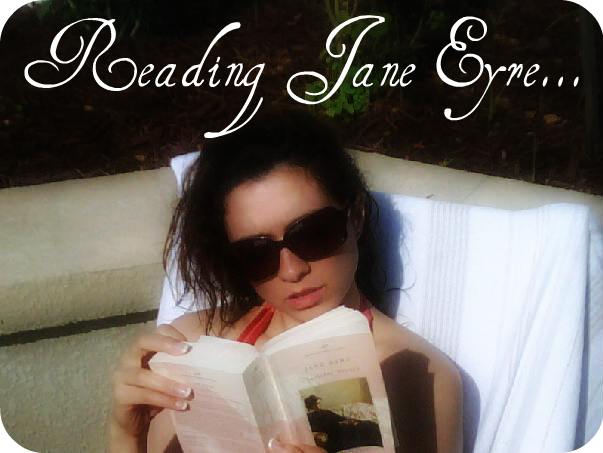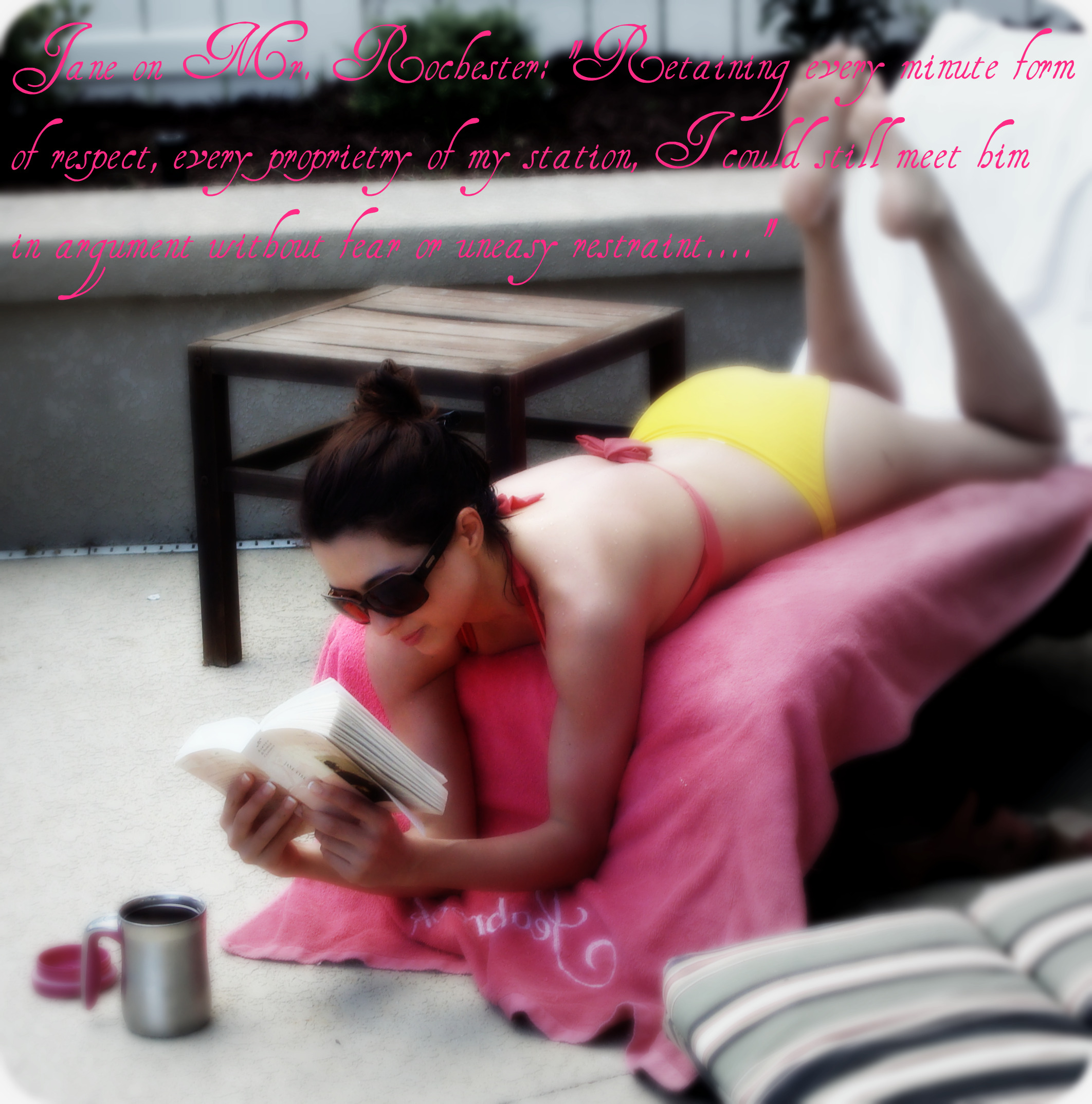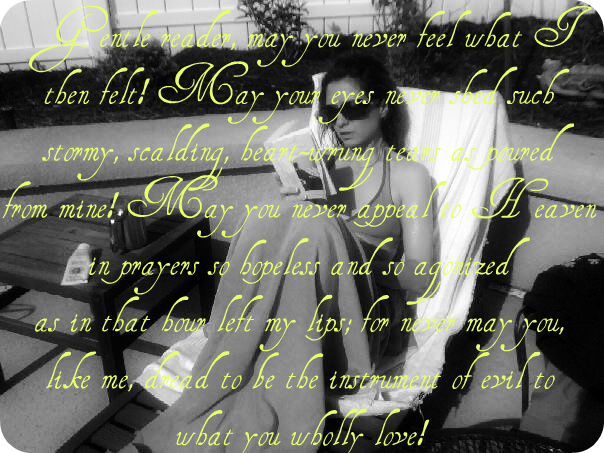Reading Jane Eyre marks one of my most bittersweet journeys into a novel and into a character’s life and psyche.

I read Charlotte Brontë‘s masterpiece of accomplishment for an unusual reason. I wanted to find a way to get closer to her sister, Emily Brontë. I devoured Emily’s singular publication of “Wuthering Heights“, a story that is at the same time gripping, disturbing, addictive, tragic and sublimely written. Emily Brontë sadly lived her own version of tragedy by departing the world far too soon at the hands of a cruel disease. The excerpt at the beginning of Wuthering Heights explains the close relationship of the sisters, and implies the lonely life that must have followed for Charlotte Brontë after losing Emily and her other siblings. After learning that Charlotte Brontë particularly disliked one of my favorite authors, Jane Austen for her idealistic characters and happy endings, I was not enthused to delve into her work.
Personality or perceived personality of an author can easily influence my judgment of a book, and for all I know, that personality may either be falsely documented or have no bearing whatsoever on the masterpiece in question. Reading Jane Eyre is a testament to that theory, as it was indeed a masterpiece all its own. While I long to find ways to get closer to the genius of Emily Brontë, I have a new found appreciation of yet anther classic of our time that is a marvel, a masterpiece, and a monument of achievement, that of Jane Eyre.
When I was first started with Jane Eyre, I am sad to say the story of little Jane did not pull me in immediately. I put the book down several times before I found it irresistible to stop reading. Charlotte Brontë tells a powerful tale, one of a child’s suffering at the hands of cruel relatives, and yet crueler headmaster and teachers, after which adulthood presents her with brand new challenges. She tells the story of Jane Eyre with poignant details in first person to the Reader, as Jane refers to us. It becomes easy to visualize such horrific situations when the writing is sublime, and yet difficult to believe that such terrible circumstances and injustice built the character that we meet in Jane Eyre.
Reading is the best pastime for an active mind! If you like to see the other book reviews, check the index of In Print.
She is a character hardly like any other fictional characters. Perhaps the closest I imagined Jane Eyre to be was to Cosette in Jean Val Jean’s “Les Misérables“. The similarities stop, however, beyond circumstantial. Both Cosette and Jane are at the hands of cruel adults and both emerge strong and unshaken and meet a happy destiny. But Cosette was compassionate, kind, and forgiving toward the brutal Thenardiers. Jane felt no such kindness or sympathy towards her Aunt Reed and no obligation to obey or forgive the evil Mr. Brocklehurst of Lowood School. Even though later she visits Aunt Reed on her deathbed, and offers her forgiveness to this woman who despises her, she holds back a sense of pride and integrity, a sense of victory over the circumstance. It is this trait about Jane Eyre that makes even her evil Aunt shudder in her presence; she finds Jane to be the most unusual creature given the nature of her situation. How could Jane dare be so brave, so confident, so courageous? And I say why would she not dare when there is nothing in this world for her to lose, and nothing left to live for if she betrays her own character and identity?

I liked the character I met and came to know in the awkward, small-framed, plain-faced, and unconditionally honest Jane Eyre. I liked that she questioned the forgiveness of others on which her dear friend, Helen Burns, persisted. While Jane loved and depended on Helen Burns for sustenance and livelihood at Lowood, Helen seemed not to need. She was a darling friend, but she was alone on her path. She was the embodiment of a sad unloved child, and the only person in the world to whom she did not seem this way was herself, because Helen Burns was made from the traits of a pure angel and believed in her Bible and her God. The dialogues at Lowood between Jane and Helen first pulled me in deep into the story. How Jane argued with Helen and voiced her pent-up outrage of the Lowood staff, and in return, Helen who held no anger, no judgment, no animosity, not even frustration against the unnecessary harsh treatments she herself received, would calm and teach Jane to accept and show only compassion. When the easily avoidable fate of dying from typhus epidemic at the neglect of the evil headmaster met with Helen, Jane suffered much. It seemed to me that at this point in her life, Jane decided to let Helen influence her ways, and help her shed some of the layers of her anger, no matter how justified, and pursue freedom of the self in the process. It was this realization that I believe brought her to her Aunt Reed’s deathbed with a heart ready to forgive and ready to move on.
The writing of Charlotte Brontë is commendable. How else would I finish 527 pages in under a month, and still be filled with regret that the story ended much too quickly! The unique voice of Jane Eyre, addressing us as Reader, taking us aside to make confessions or clarifications, makes us a stakeholder in her life. She involves us directly by giving us a name, as though she is taking our hand and walking us through each phase of her life. There is the obviously remarkable use of the English language; the orchestra of words and phrases making a symphony in our ears like no conversation today is capable of achieving. There is the rare talent of Brontë sisters in achieving the insurmountable through words, that of evoking every human emotion possible, that of reaching into our core and touching us, that of lasting through the centuries well after their time has passed. It is the writing that we crave, that we worship, that to which we return. It is the reason for which we call the work of authors like Brontë sisters a classic, a masterpiece, an indelible weaving of words onto paper for all generations to enjoy and learn from.
“I tired of the routine of eight years in one afternoon.”
The character of Jane Eyre is awkward and strange to all around her, unique among all whom she meets, and exemplary to the readers of her tale in many fine ways. After 8 years of “servitude” at Lowood, and after her teacher and friend, Miss Temple, leaves to settle into married life, Jane becomes restless. Here we read yet another one of my many favorite monologues with Jane, as she is faced with circumstances which require her whole being to consider and find a solution for, and for the first time, she realizes that she has a choice. Living with her Aunt and going to Lowood were no choice of her own, but now, as a grown woman with a solid education, she realizes she has a choice, while still fully aware of the limitations of her options. This realization is empowering, as she analyzes her option to apply for the position of “servitude” elsewhere from Lowood. This passage marks one of such passages.
“A new servitude! There is something in that,” I soliloquized…..”I know there is, because it does not sound too sweet; it is not like such words as Liberty, Excitement, Enjoyment; delightful sounds, truly; but no more than sounds for me; and so hollow and fleeting that it is a mere waste of time to listen to them. But servitude! that must be matter of fact. Any one may serve; I have served here eight years; now all I want is to serve elsewhere. Can I not get so much of my own will? Is not the thing feasible? Yes, yes; the end is not so difficult, if I had only a brain active enough to ferret out the means of attaining it.” pg. 94.
Moments after she utters this soliloquy, she hears a voice tell her to advertise, and it is whence that she lands the position of a governess at Thornfield Hall.

There are love stories that we envy, that we wish we could partake in even for a day, if only the chance meeting with that hero or heroine presented itself in our own ordinary lives. The love story of Mr. Edward Rochester and Jane Eyre did not strike me as one such story. Theirs was a love story that I could only be a witness to; a story which I needed to read to the very end and forever know about but never wish for. The kind of love story where two people from most dissimilar backgrounds and of least commonality find a kindred spirit in one another. Two people who seem to need no one else, wish for no fulfillment through a relationship, and stand entirely independent and proud on their own, find life impossible without one another. The kind of love story that both sides resist, fight, hold back, and deny reality, only to come back to another with stronger force than before, and feel regret over lost time. This is the love story of Jane Eyre, told through her oddly plain and extremely acute perspective, and through her, we get to know Mr. Rochester, the lonely, stern, and introvert master of Thornfield Hall.
Jane’s life as a governess at Thornfield Hall begins a new phase of much emotional struggle and growth for her. While the comfort of her new-found life is beyond her expectations, and the regard of Mrs. Fairfax for her a warm welcome to her new discovered place in this world, Mr. Rochester continues to mystify her in every encounter. The evening dialogues with him add more to the mystery of his character, and intrigue Jane beyond her own comfort level. The occupation of Adele keeps Jane busy enough during the day, but when evening sets, contemplation rules her mind and introduces sensations and emotions that are foreign to her. The beginnings with Mr. Rochester are unpleasant, his tone is ruthless and his intentions unclear.
“You never felt jealousy, did you, Miss Eyre? Of course not; I need not ask you; because you never felt love.”
This is the manner in which he speaks to her.
“Your soul sleeps; the shock is yet to be given which shall awaken it….”
Now it is not secret that Jane Eyre defends herself bravely with the mastery of her language and command of her manners. Mr. Rochester presents no threat to her, only an unpleasant mystery that she wants to unravel, and her language, her words and her prose dig like sharp edges of a knife at his skin, grazing the surface and torturing the layer just beneath it, tormenting him in ways that he is absolutely baffled with. Yet Mr. Rochester founds ways to bestow kindness upon Jane, every ounce of which she absorbed, so starved for kindness she had been all her life. There are moments of tenderness exchanged between them in the quiet evenings of formal conversation sitting across from the room. While barely exchanging glances, they exchange ideas, opinions, and mind-share of high intellect. Through most of these conversations, Mr. Rochester administrates the discussion, posing questions to Jane, sharing what of his story and peering at her to learn of her thoughts on every subject at hand. He is wholly curious about that mind, from “that head I see now on your shoulders”, as he observes when admiring her brilliant art work.
There is a strange sequence of events from the love affair that ensues. In most cases, a love affair’s climax in traditional sense is when it follows a proposal and marriage. In this case, Charlotte Brontë chooses despair and anxiety as the primary feelings of a most unhappy Jane Eyre after Mr. Rochester’s proposal. The proposal itself, far from a climax or a happy occasion, comes about on the occasion of Jane’s casual walk into the garden to find the recently engaged Mr. Rochester confess his love for her. There is earnestness and tenderness in Mr. Rochester’s proposal, but desperation rules the tone.
You, Jane. I must have you for my own – entirely my own. Will you be mine? Say yes, quickly.”
The desperation we are led to understand is the deep dark secret of Mr. Rochester’s crazy living wife. When I first read that Jane Eyre was Gothic fiction, a style of writing that combines elements of horror and romance, it came as a surprise. The element of romance, yes – a strange, desperate, unlikely romance – but an element of horror, I would not rate it as such. The secret wife of Mr. Rochester makes several sinister ghost-like appearances, causing Jane much anxiety with each one. The attempted murder of Mr. Rochester through fire, and the eventual destruction of Thornfield Hall at the hands of his lunatic wife are disturbing, frightening and ominous but perhaps I define horror differently. I know that I would avoid horror in classics or movies at all costs, and if I had known Jane Eyre was classified as such, I would have sadly dismissed it. Horror is defined as fear and revulsion, and while Jane’s pangs of hunger on her bitter journey away from Mr. Rochester bring such a picture to mind, I refuse to classify Jane Eyre with any element of horror attached.
St. John Rivers. He must have played a higher role in Charlotte Brontë’s intentions for his character. Why else would she end the story of Jane Eyre with a letter from St. John? Perhaps it was the coincidence of being last in the sequential update that Jane gives us of her loved ones, herself and Mr. Rochester, then her new cousins, and last St. John. Then if so, why end the story of Jane Eyre with such a strong tone of piety, of all ways that she could have completed her story? I neither liked the character of St. John, nor his disgusting attempts at pursuing Jane to marry him for serving in the missionary roles, and least of all, Jane’s less-than-solid attempts at dismissing it altogether. While her resolve kept her senses in check long enough to decline – multiple times – her responses were softened, and the best explanation has to be the security of having gained a cousin in St. John per the recent events, and to risk breaking with that family was simply unthinkable. We know how she rejoiced not at the news of her having an inheritance of 20 thousand pounds, but at the discovery of having family and relations in this world, of which St. John was one.
Jane’s true struggle in life, surpassing her horrific circumstances at her Aunt Reed’s and Lowood School both, start the moment she falls in love with Mr. Rochester. The mental torment that this tiny creature endures at the hands of twisted fate test her to her soft core. The knowledge of learning that Mr. Rochester is married to a shackled lunatic on his intended wedding day to Jane herself is shocking and painful, no doubt – but it pales in comparison to the struggle, the depth of affliction and sorrow, that follows in the hours and days ahead when Jane decides what to do next. Mr. Rochester later utters this phrase to Jane, which seemed so fitting although heaps more elegant than what I kept asking her through that struggle,
“You are altogether a human being, Jane?“
It is unrealistic to justifiably re-tell some parts of the story of Jane Eyre. Her fight for survival against hunger and thirst, her close brush with death from this choice she made of walking away for a matter of principle, those are the passages that make you question a human being’s choice versus a higher being with a much larger purpose. The series of all these events test Jane every day, at every turn, in every phase of her life, and she emerges remarkably well, a truly unforgettable character to her Reader, with a tale that cannot be read or told too many times.
 I am Farnoosh, the founder of Prolific Living. So glad you are here. My mission is to empower you to unblock your creative genius to live your dream life.
I am Farnoosh, the founder of Prolific Living. So glad you are here. My mission is to empower you to unblock your creative genius to live your dream life.